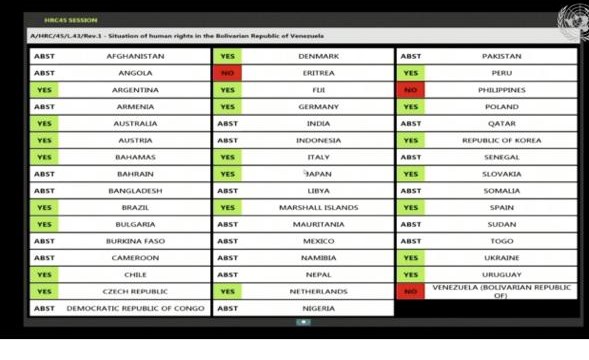
HRC45 | Push for accountability in Venezuela gets a boost as UN investigation set to continue
The Human Rights Council has shown its worth by renewing and strengthening the mandate of the Fact-Finding Mission on Venezuela – a key instrument in the push for accountability of human rights violations and part of a multi-pronged UN approach to the crises in the country.
The Human Rights Council addressed with human rights crises in Venezuela in the context of the findings of the Independent Fact-Finding Mission on Venezuela: the likely commission of crimes against humanity in Venezuela. In a vote of 22 – 3 (22 abstentions) – an increase on the support shown when the Mission was created a year ago – the Council renewed the Mission’s mandate for a further two years and extended the scope of its mandate.
‘The gravity of the crimes detailed by the Mission meant the Council couldn’t look away,’ said ISHR’s Eleanor Openshaw. ‘The push for accountability for these crimes gets a boost with the Mission now able to deepen its enquiry.’
During the vote, all eyes were on Latin American Council members, Argentina, Uruguay and Mexico. Whilst Argentina and Uruguay supported the resolution, Mexico abstained referencing a supposed ´politicized´ process and indicating that a 2- year mandate would reduce scrutiny.
‘Mexico’s position is deeply disappointing,’ said Openshaw. ‘The reasons they put forward not to support the mandate don’t stack up.’
‘Consensus across the region in support of the Mission would have sent a powerful message to Venezuela that it needs to take responsibility for the human rights crisis in the country and address it,’ she added.
Two resolutions were considered by the Council, as in 2019, making evident splits in what is considered an appropriate response to the Venezuelan crises. Both resolutions include a focus on the importance of the Office of the High Commissioner for Human Rights in the country. The resolution renewing the mandate of the Fact-Finding Mission, however, provides for a multi-pronged more hard-hitting approach to the Venezuelan crises including both the Mission and OHCHR.
‘The fact-finding mission on Venezuela and the work of OHCHR are complementary. They push for human rights change in ways that reinforce each other and keep necessary pressure on Venezuela’, said Openshaw.
Venezuela and its allies argued that it was cooperating with the UN and that the work of the Fact-Finding Mission undermined the work of OHCHR.
‘This argument doesn’t cut it. Whilst some progress has been made, Venezuela has consistently failed to meet a range of UN recommendations and demands and – of course – failed to cooperate in any fashion with the Fact-Finding Mission,’ she added.
The Council decision isn’t the end of the story. As with all Council resolutions, the ones on Venezuela need to be adopted by the GA Third Committee and Plenary, and then funds be approved by the GA Fifth Committee and the Plenary.
With the adoption of the two Council resolutions, Venezuela will remain on the Council agenda each session between March 2021 and March 2022 through reporting by both the Office of the High Commissioner and the Fact-Finding Mission. A final Fact-Finding Mission report is requested for September 2022.
The resolution renewing the mandate of the fact-finding mission also requests that Mission reports, as well as those of OHCHR be submitted by the General Assembly ‘to all relevant United Nations bodies for appropriate action’.
‘This opens up the possibility for the General Assembly to send the report to Security Council which could provide a means to press for action by the ICC,’ said Openshaw.
Contact: Eleanor Openshaw [email protected]
Photo: ISHR
